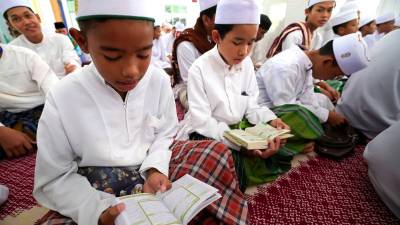KUALA LUMPUR: Prime Minister Datuk Seri Anwar Ibrahim has reaffirmed the MADANI government’s commitment to enhancing the development of pondok schools and people’s religious schools to ensure they are not left behind in the national education agenda.
Anwar, who is also the Minister of Finance, acknowledged the wide disparity in facilities between these institutions and mainstream national schools.
He said that since 2022, the MADANI administration has reinstated allocations that were previously cancelled by the opposition when they were in power.
“I recently met with the pondok teachers who voiced their concerns after their current state government under SG4 (State Government 4) cancelled all allocations for the people’s religious schools. I strongly disagree with such decisions.
“So in 2022, we returned all the allocations to people’s religious schools…yes, by this so-called ‘tyrannical’ MADANI government,” he said during the Minister’s Question Time in the Dewan Rakyat today.
He was responding to a supplementary question from Opposition Leader Datuk Seri Hamzah Zainudin (PN–Larut) regarding efforts to close the income gap between Bumiputeras and non-Bumiputeras, as well as between regions under the 13th Malaysia Plan (13MP).
Anwar said the Implementation Coordination Unit (ICU) of the Prime Minister’s Department (JPM) had also been instructed to conduct a study to improve pondok institutions because their facilities were very poor, although some parties opposed his intention to upgrade pondok schools in opposition areas.
The Prime Minister said he had instructed the Implementation Coordination Unit (ICU) of the Prime Minister’s Department to conduct a study aimed at improving pondok institutions, many of which continue to operate with inadequate infrastructure, despite objections from certain quarters who oppose funding upgrades in opposition-led states.
Anwar emphasised that upgrading and supporting pondok schools is a vital step in narrowing the social gap, in line with the 13MP objectives.
“Some say we should ignore these schools because they are in opposition areas. I don’t care about that, because those are our children, and they deserve quality education. Pondok schools were once strongholds of Islamic faith, knowledge, and strength. We must protect and uplift them,“ he said.
He added that the government intends to retain traditional Islamic studies such as Quran memorisation (huffaz), while integrating modern elements such as Technical and Vocational Education and Training (TVET), digital skills, and Artificial Intelligence (AI) to future-proof the students.
“I will go down to the ground to assess and find ways to upgrade pondok schools. This is part of our efforts to reduce inequality, as there is a significant gap between pondok schools, religious schools, and national secondary schools.”
To address the development gap between Peninsular Malaysia and Sabah and Sarawak, Anwar said the government fully supports transforming Sarawak into a regional energy hub and is committed to boosting Sabah’s blue economy to drive both states’ economic growth.
Regarding the allocation to opposition states, the Prime Minister pointed out that federal allocations for Kelantan, Terengganu, Perlis, and Kedah have increased compared to the previous federal administration under the opposition.
“For example, in Kedah, under the Muda Agricultural Development Authority (MADA), we approved an allocation of RM1 billion. Many padi farmers there support the opposition, but I have never questioned that. On the contrary, we accelerated the process to help them,“ he said. – Bernama
